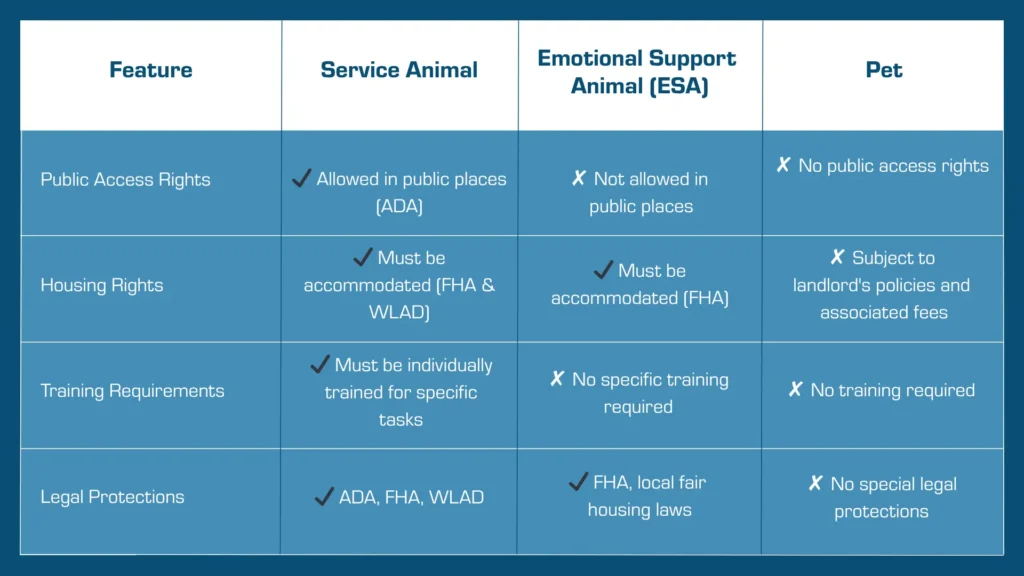In Washington State, there are specific regulations concerning pets in rental properties. According to the Washington State Residential Landlord-Tenant Act (RLTA), tenants are allowed to have pets unless it’s explicitly stated in the rental agreement. So, landlords have the right to disallow pets in their rental properties, but this needs to be stated in the lease.
And while landlords can charge a pet damage deposit or pet rent on their rental properties in some parts of Washington State, emotional support animals (ESAs) and service animals are an exception to that rule.
Understanding service animal laws and regulations at the federal, state and local level is important for all Seattle landlords. In this guide, we’re breaking down everything you need to know about having pets, ESAs, and service animals in your rental property.
Key Takeaways
- Service animals and ESAs are legally distinct from pets and must be accommodated, even in “no-pet” properties.
- Service animals and ESAs are protected under state and federal law in Seattle.
- You can’t charge fees or enforce pet restrictions on verified service animals or ESAs.
- Proper documentation—and boundaries—matter when determining if an animal is a service animal or ESA.
The Important Terms Landlords Need to Know
Let’s get started by defining some of the most important terms to know when learning everything you need to know about service animals, emotional support animals, and the laws in Washington State and Seattle.
What is a Service Animal
Under the Americans with Disabilities Act (ADA) and the Washington Law Against Discrimination (WLAD), a service animal is defined as a dog (or in some cases, a miniature horse) that is individually trained to do work or perform tasks directly related to an individual’s disability. This can include:
- Guiding a person who is blind.
- Alerting someone who is deaf.
- Pulling a wheelchair.
- Detecting and responding to seizures or blood sugar levels.
Service animals are not pets and cannot be excluded from housing, even with a “no-pet” policy. Pet deposits or additional fees cannot be charged by the landlord for service animals.
What is an Emotional Support Animal (ESA)?
An ESA is defined as an animal (not limited to dogs) that provides comfort or emotional support that alleviates symptoms of a person’s disability. ESAs don’t require specialized training to perform specific tasks, and they’re not protected under the ADA, so they’re not guaranteed access to public facilities like restaurants or stores.
But ESAs must be accommodated in rental properties if the tenant has a verified disability and a legitimate need for the animal. Landlords can request documentation from a licensed healthcare provider to confirm the legitimacy of the ESA, but they cannot charge pet fees or deposits for ESAs.
What’s the Difference Between Service Animals, ESAs, and Pets?
There are key differences between service animals, ESAs, and pets that affect how they must be treated in rental properties. It’s important that landlords understand these differences and act accordingly.

Applicable Laws for Seattle Landlords
There is more than one law that applies to how landlords manage service animals and ESAs. Understanding these laws—and how they interact with each other—is essential to staying compliant and fair when renting to tenants with service animals or ESAs. Seattle landlords must follow a combination of federal, state, and local laws.
Federal Laws
There are two federal acts that pertain to how service animals and ESAs are treated:
- Americans with Disabilities Act (ADA): The ADA applies to service animals only and requires public places, including common areas in housing complexes, to allow access to trained service dogs. As a landlord, you cannot ask about your tenant’s disability. You can only ask if the animal is required for a disability and what task it performs.
- Fair Housing Act (FHA): The Fair Housing Act covers both service animals and ESAs in housing situations. It requires landlords make reasonable accommodations for those with service animals or ESAs, even if they have a no-pet policy in place. The FHA bans extra pet fees, breed restrictions, or pet deposits for assistance animals. It also allows landlords to request documentation for ESAs to confirm the tenant has a disability-related need.
Washington State Laws
There are two Washington State laws that landlords need to be aware of:
- Washington Law Against Discrimination (WLAD – RCW 49.60): WLAD provides additional state-level protections for individuals with disabilities. It protects the rights of tenants with service animals and ESAs, and further prohibits discrimination based on disability in the housing market.
- Washington Landlord-Tenant Act (RCW 59.18): This governs landlord and tenant responsibilities and rights, but it’s important to know it doesn’t override disability accommodation laws. Instead, it provides context for how landlords must operate.
Seattle-Specific Rules
There are two Seattle-specific rules that govern how Seattle landlords handle service animals and ESAs:
- Seattle Office for Civil Rights: If you’re looking for information, the Seattle Office for Civil Rights provides detailed local enforcement and education around ESA and service animal rights. It promotes equitable access to housing, especially for renters with disabilities.
- No Pet Fees for Assistance Animals: States that Seattle landlords cannot charge pet rent, fees, or deposits for any verified service animal or ESA, even if their policy normally requires it.
Responsibilities of Seattle Landlords
Seattle landlords are legally obligated to accommodate tenants with service animals and ESAs, regardless of their existing pet policies. Let’s break down what you need to know to stay compliant and respectful when renting to tenants who have assistance animals.
Accepting ESAs and Service Animals
In Seattle, landlords are within their rights to have a no-pet policy for their rental units. But that policy is not applicable to service animals or ESAs, as they are not considered pets. You must make reasonable accommodations for tenants who require assistance animals.
Refusing to lease your property to a tenant because they have a service animal or ESA is considered discrimination under the Fair Housing Act, Washington Law Against Discrimination, and Seattle Municipal Code. Refusing to lease to someone because they have a service animal is illegal and can result in costly penalties, lawsuits, and damage to your reputation as a landlord.
Under the Fair Housing Act, you can be:
- Fined up to $16,000 for a first violation, and up to $65,000 for repeat violations.
- Sued in a civil lawsuit for compensatory damages like emotional distress or moving costs, punitive damages, or attorney’s fees.
- Investigated by the U.S. Department of Housing and Urban Development which can result in penalties or settlements.
Under the Washington Law Against Discrimination, you can be:
- Served a cease and desist order.
- Fined or forced to pay damages.
- Ordered to take mandatory training or policy changes.
- Potentially referred to the Attorney General’s office for further action.
Under Seattle law, you can be:
- Fined per violation
- Required to compensate the tenant.
- Required to change your leasing practices.
- Faced with the loss of your business license.
Documentation and Appropriate Verification
Understanding what kind of documentation you can and can’t ask for will help ensure you stay compliant. For service animals, you cannot ask for documentation, proof of training, or details about the tenant’s disability but you can ask two specific questions:
- Is the animal required because of a disability?
- What task or work has the animal been trained to perform?
For emotional support animals, you cannot request medical records or personal health details, but you can request written documentation from a licensed healthcare provider to confirm:
- The tenant has a disability.
- The animal is needed to support their mental or emotional well-being.
Common Mistakes to Avoid
There are some common pitfalls that all Seattle landlords should be aware of in order to avoid them. When you’re leasing to a person with a service animal or ESA, you cannot:
- Charge pet rent, pet deposits, or additional fees for service animals or ESAs.
- Restrict based on breed, weight, or size for verified assistance animals.
- Ask about the tenant’s specific disability or request intrusive medical information.
By understanding and following your responsibilities, you stay compliant and you foster a fair, inclusive, and welcoming rental environment for all Seattle renters.
3 Tips for Compliance to Service Animal Laws in Seattle
Staying compliant with federal, state, and local animal service laws does much more than protect you legally. It also helps build trust and clarity with tenants. Here are four tips to put into action to keep your rental and leasing practices aligned with all applicable rules and regulations.
1. Update Lease Language
Take a look at your standard lease and ensure there is clear language that outlines the difference between pets and assistance animals. Consider including a statement like: “Assistance animals are not considered pets and are permitted as a reasonable accommodation under federal, state, and local law.”
2. Train Your Team
If you’re working with a team, ensure they are educated on the differences between pets, service animals, and ESAs; what documentation is allowed; and how to respond to accommodation requests professionally and legally.
If you are working with a professional property management company, ensure they are reputable and ready to work within the constraints of the above laws.
3. Keep Thorough Documentation
As with all things surrounding your rental property, it’s important to keep meticulous written records of everything to do with tenants and assistance animals. Be sure to maintain written records of:
- Requests for accommodations.
- Communications with tenants.
- Any verification or documentation provided (especially for ESAs).
- Decisions made and the reasoning behind them
These records can protect you in the event of a complaint or legal dispute.
Take the Stress out of Managing Assistance Animals
Navigating the legalities surrounding pets, emotional support animals, and service animals may seem complex, but it is essential for Seattle landlords. Staying compliant is about more than simply avoiding penalties—it’s about providing inclusive housing for tenants with disabilities.
Understanding the distinctions between pets, ESAs, and service animals; knowing what documentation is appropriate; and ensuring your lease, policies, and team are aligned with the law will protect both your tenants and your business.
But if managing all of that is too overwhelming, working with a reputable property management company can help relieve any potential stress. If you’re looking for reliable, experienced property management in Seattle, SJA Property Management offers the trusted support and local expertise you need. Our team is here to make property ownership easier—so you can focus on the returns, not the stress.
ESA and Service Animal Laws FAQs
Are there ESA laws in Seattle?
While there are no Seattle-specific laws, Seattle landlords must comply with federal Fair Housing Act (FHA) regulations, which require reasonable accommodations for tenants with ESAs.
Do landlords have to accept emotional support animals in Washington?
Under the federal Fair Housing Act, landlords in Washington must make reasonable accommodations for tenants with ESAs, even if the property has a no-pet policy.
What qualifies as a service animal in Washington state?
A service animal is defined as a dog or miniature horse that is trained to perform tasks directly related to an individual’s disability.
Can you charge a pet deposit for an emotional support animal in Washington state?
Landlords cannot charge pet deposits, fees, or rent for ESAs, as they are not consider.
Is pet rent legal in Seattle?
Landlords in Seattle can charge pet rent for pets, but service animals and ESAs are not pets therefore cannot be charged any pet fees.






